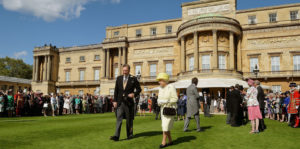B
Why is it that every hospital in Sri Lanka (including the costly private hospitals and clinics) is crowded with people these days? It is simply because the majority of the population has a health problem? In short, we are a sick society, in every respect, technically and otherwise.
Some become obese by overeating; women particularly end up in extensive workout programmes, whereas the men folk take it for granted and allow their bellies to protrude akin to six-month-old pregnant women! People generally do not bother about their health, until something goes wrong with their system. Some become alarmed when they suddenly detect they suffer from diabetes. Others get distressed with hypertension and start taking dozens of tablets, which in turn make them sicklier. Others become apprehensive when they suffer a heart attack and have to undergo open-heart cardio vascular surgery, costing an arm and a leg, at a private hospital. Many who are able to afford private hospital treatment prefer to do so, despite there being efficient and expert surgeons working in Sri Lanka’s National Hospital. Here of course, the general public cannot be blamed, for the very reason the National Hospital is very much restricted and limited in the number of paying wards.
Healthy foods
Coming back to the type of food people are compelled to eat at present, numerous videos in the internet display how fish and prawns are injected with chemicals to preserve its texture for longer periods. One-day old baby chicks are injected with hormones, in order to make chicken that weigh three to four kg in four to six weeks. When humans consume such meat, automatically such hormones affect the human systems too, and that is why today the younger generation tends to grow and become six-foot strappers, and young girls attain puberty even at a lesser age!
All preserved food items contain chemicals, which are harmful to the human system. That may be why some prefer to eat ‘organic’food, though expensive. By the same token, would it be possible for people (in Sri Lanka) to have one hundred per cent faith in traders who firmly admit that everything is grown with organic manure, when we live in a society where the unscrupulous merchants endeavour to earn a buck by mixing ‘papaya seeds’with ‘pepper corns’and ‘brick dust’in ‘chillie powder’and so forth?
In such a backdrop, it makes sense to assume why present-day human beings are increasingly becoming nasty to each other, in addition to being unhealthy. Is it then due to consumption of ‘poisonous’ foods day in and day out?
From a spiritual perspective, Buddhists and Hindus believe diseases are completely dependent upon one’s negative karma (law of cause and effect), and that is the reason for some to be born as deformed, and others compelled to suffer from nasty diseases such as cancer. Buddhists and Hindus, who believe completely in the theory of karma should, therefore, refrain from considering one’s mistake, problems or deformity and stop criticising, while they firmly believe in retribution.
Laughter as medicine
If one is able to laugh with others, but certainly NOT laugh AT others, it is said to be a way of healthy living by maintaining tranquillity within oneself, and thereby increasing one’s circulation. There are so many instances, where Sri Lankans have come out of tricky situations, quite cleverly, using their presence of mind. Such incidents will automatically make one to laugh promptly. After all, life is too short to take everything on a serious note, and even medical men advise that laugher as the best medicine.
There are many examples of Sri Lankans, especially those living abroad, who have come out of tricky situations displaying their gumption where one cannot help laughing. One pious individual, as an example, bought a house on a mortgage in London, and allocated a separate room for his religious activities and considered it as his prayer room. Later, he decided to display a prominent notice above the door to the room: ‘This room is prayer-conditioned!’
Appuhamy suffered from severe constipation, and assumed it was due to the lack of roughage in his food and consulted his general practitioner, who prescribed him some Glycerine suppositories. He bought the medicine from a local pharmacy and swallowed the first suppository with water until his flat mate advised him that he was supposed to moisten the tip and insert the suppository in the anal canal!
A personal friend of the writer, a well-known homeopath in Sri Lanka, but very hazy with Sinhala words, uses an Ayurvedic therapy known as ‘cupping’ on entwined muscles of patients, which is an inverse of massage. In this operation, rather than applying pressure to muscles, he uses suction pressure to the affected part of the muscle to pull skin, tissue and muscles upwards in an attempt to smoothen the contracted muscle(s). Cupping therapyis well known as one of the best deep-tissue Ayurvedic therapies available. Although the treatment is tolerably painful, the results are immediate. Once a female patient, suffering from a severe back pain, was treated by him with the cupping therapy. After a few days, my friend, by mistaken identity, decided to enquire from a stranger (thinking it was his patient) whether the “cupping therapy improved her backache”.
In another situation, the writer has mentioned on several occasions about an incident inside a private bus in Sri Lanka. Passengers were getting jam packed inside the bus, but the conductor continued to overload the bus unhesitatingly. In the middle area of the bus was a lady propped up by a decent looking gentleman behind her, donning an immaculate white national dress. As the bus became ‘sardine packed’ at every halt, along with constant jolts and bumps during the ride, the poor gentleman had no choice but to stay put without being able to move even an inch from where he was standing other than propping up the lady in front of him.

At a certain point, the woman turned back towards the gentleman and shouted brashly, ‘me thamuse monawada oyi karrene’? (What the heck are you up to). The flushed gentleman had to use his presence of mind to prevent getting beaten up by other commuters inside the bus due to the way the woman shouted at him in an accusing manner. He simply smiled and said ‘Ah mama den Piliyandala iskoleka ugannana wane’! ( Oh! I am now teaching at a Piliyandala school), which saved his skin. Such experiences may sound hilarious, but equally demonstrates on individual ingenuity of getting ‘out of the woods’ in certain tricky situations.

Garden party – Queen meets guests and shakes hands with them
It is worth repeating another anecdote about a prominent Sri Lankan dentist, the late Dr. Nalaka Fernando, who was once introduced to the H.M. Queen Elizabeth II, at one of the Buckingham Palace Garden parties in London. The Sri Lankan High Commissioner introduced him to the Queen stating, “Your Majesty may I present to you a prominent Sri Lankan dentist, in London, Dr. Nalaka Fernando.” The Queen, with a charming smile, replied: “How nice it would be Mr. Fernando, if we all do not have to visit the hairdresser and the dentist from the time we are born”. Nalaka responded thus: “All pain is mental, your Majesty, but the one that is both mental and physical is dental”! Quite amused Queen wanted Nalaka to repeat that again and said, “Can you repeat that again Mr. Fernando, I want to add it to my collection”.
Medical authorities insist that human beings need humour to help them relax and cultivate happiness and good health. In that context, the few examples of Sri Lankans mentioned above have certainly been sufficient, towards creating a sense of humour when applied into our daily lives.
pic credit: Google photos, Ceylon Today and & Buckingham Palace websiyr






